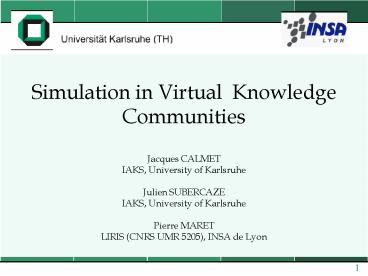Simulation in Virtual Knowledge Communities - PowerPoint PPT Presentation
1 / 17
Title:
Simulation in Virtual Knowledge Communities
Description:
Virtual Knowledge Communities : ... A virtual community is a group whose members are connected ... Virtual communities : knowledge exchange using a blackboard ... – PowerPoint PPT presentation
Number of Views:36
Avg rating:3.0/5.0
Title: Simulation in Virtual Knowledge Communities
1
Simulation in Virtual Knowledge
CommunitiesJacques CALMETIAKS, University of
KarlsruheJulien SUBERCAZEIAKS, University of
KarlsruhePierre MARETLIRIS (CNRS UMR 5205),
INSA de Lyon
1
2
Structure of the speech
Introduction Simulation definition,
implementation Basic measures for the
analysis Experimental results Conclusion
2
3
Introduction
- Virtual Knowledge Communities
- Groups of people with similar interests who
communicate and interact in an online environment
John Beech - A virtual community is a group whose members
are connected by means of information
technologies Experts archive question
3
4
Scope
- Multi Agent System approach for VKC
- Agents members of the community, the
community architecture can also be made of agents - Communication channels all the possibilities
offered by MAS internet, telephony
4
5
Agent Oriented Abstraction
- AOA Paradigm Calmet, Maret, Endsuleit
- Agents are made of two components
- Annotated knowledge Knowledge annotations are
classes or types structuring the knowledge
possessed by or associated - to agents
- Decision mechanism process by which an agent
can reach its assigned goals. It is based upon
the contents of the knowledge component. A
decision mechanism is characterized - by its utility.
5
6
Simulation Why?
- To model knowledge communities and test the
models - Corporate knowledge
- Knowledge distribution like Hospital
- Evaluate the performance of the frameworks
- Communication performance
- Stability
- Compare some prototypes
- Knowledge distribution efficiency
6
7
Simulation - Process
Design of the scenario
Execution of the scenario. Collect data
Analyse of the collected data
7
8
Design of the scenario
- A scenario is a tuple ltS,A,C,Z,R,Tgt
- Prototype system S
- Set of agents A
- Set of agent's classes C
- Set of actions Z
- Set of relations between the agents R
- Time length T
8
9
Collecting the data
- Three classes of data can be collected
- Communication data the exchanged messages
- Satisfaction level of the agent
- Knowledge of the agent
9
10
Implementation
- Prototype for VKC at the IAKS Karlsruhe
Calmet,Hammond,Maret - Follows the AOA paradigm Knowledge and
decision - Knowledge Management using RDF Ontologies
- Virtual communities knowledge exchange using a
blackboard - Community founding, searching, joining
- Agents can have their own behaviour, currently
individual and social behaviours are implemented
10
11
Simulator
- Scenario Editor
11
12
Basic measures for the analysis
For BDI agents, we define the achievement rate
f State -gt 0,1 Combined with the
communication data
12
13
Effective Knowledge Distribution
Knowledge set at the time t KA,t Global
knowledge during the simulation Effective
knowledge distribution
13
14
Experimental Results
- Statistical test for the measures, over 3 trivial
systems - Dummy agents send randomly knowledge to others
- Agents ask randomly other agents for knowledge
matching their interest. - Yellow page system agents ask other agents
having knowledge matching their interest
14
15
Experimental Results Achievement rate
15
16
Experimental Results EKD
16
17
Conclusion
- We introduced
- Formal definition of simulation
- Definition of basic measures
- Future work
- Method to collect the data on distributed system
- Collect and analyse data on the prototype
- Local method for efficiency evaluation
17































